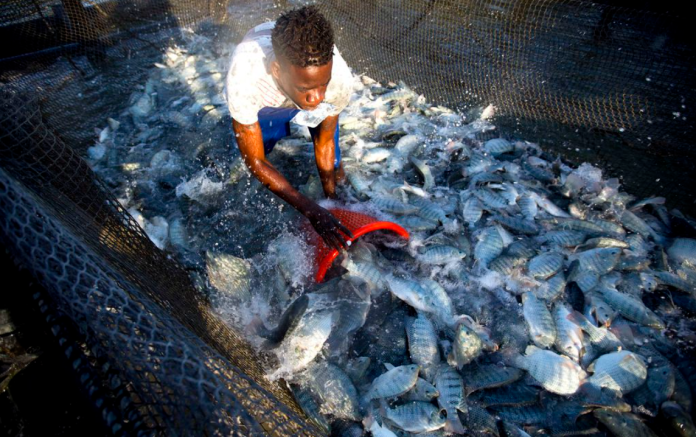Director of Aquatic Food Biosciences at WorldFish, Dr. Rodrigue Yossa Nouaga, says contrary to widely-held belief that farmed fish might not be healthy for human consumption when compared to the fish caught in the wild, both farmed and wild-caught fish can be part of a healthy diet.
WorldFish is managing the project titled ‘Development and Scaling of Sustainable Feeds for Resilient Aquatic Food Systems in Sub-Saharan Africa (FASA),’ which goal is to develop low-cost, highly nutritious fish feeds based on novel ingredients and enable 5,000 smallholder fish farmers in three African countries—including Nigeria—to test and adopt these ingredients and feeds, leading to increased income, improved food security, and reduced waste and pollution.
In dispelling the unproven notion about farmed fish, Dr. Nouaga says the nutritional benefits depend on a variety of factors, including the specific species of fish, their diets, the environment in which they are raised or caught, and any contaminants or pollutants they may be exposed to.
According to the scientist, it is important for consumers to be aware of the source of their fish and to consider factors such as sustainability, environmental impact, and the overall quality and safety of the fish when making choices about their seafood consumption.
Nouaga, who was previously the Global Lead on Fish Feed and Nutrition at the WorldFish, says the organization takes into consideration many factors in its activities centering on aquaculture and fish feed production for farmed tilapia.
He says local fish farmers supported by the WorldFish generally raise their fish—mainly tilapia—in controlled environments such as ponds, tanks, or enclosures, which can allow for monitoring and management of factors like water quality, diet, and disease control.
“Farmed fish are often fed specific diets to ensure balanced nutrition, which can result in consistent quality and levels of nutrients.
Plus, such fish experience less exposure to environmental contaminants, compared to some wild-caught fish, as they are not subject to the pollutants found in some natural water bodies,” he added.
Noting the economic considerations for the Nigerian food consumers, Nouaga said farmed fish are more readily available and often cheaper; and can be bred for specific traits like faster growth or improved flavor.
Speaking about faster growth, the scientist says when fish are in the wild, they have to source their food, which might be elusive in certain situations, thereby impacting their growth, such that a 10-year-old fish in the wild, for instance, might have the same weight as a year-old farmed fish.
“Obviously, a young fish is likely to be tastier, fresher and more nutritious than a 10-year-old fish,” he submits.
He adds that since the fish in the wild are omnivorous, feeding on algae, plankton, insects, and small fish, all of which leads to higher levels of omega-3 fatty acids and a potentially more diverse range of nutrients, fish farmers are also innovating, using local ingredients containing algae, plankton, insects and single-cell protein to make feed for farmed tilapia, so that they do not miss out on what they would have benefited were they to be in the wild.
The scientists says that when sourced from responsible aquaculture practices, farmed tilapia can be a sustainable option with less impact on wild populations.
“When produced using responsible and sustainable practices, it can minimize the impact on natural ecosystems,” Nouaga says; adding, “It’s important for consumers to be aware of the source and production practices of the tilapia they purchase, as responsible aquaculture practices can mitigate environmental impacts and provide a sustainable seafood option.”


